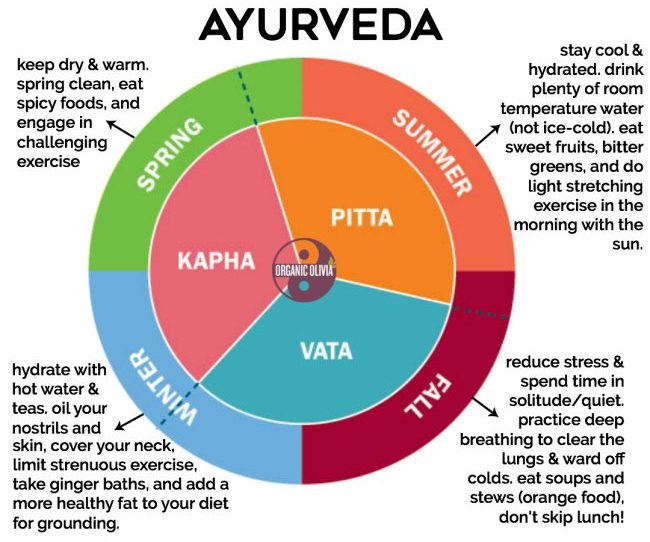Ayurveda on Food in Winters

Food as per season and Body Type : Courtesy: Organic Olivia
■ In Winter we feel hungrier than any other season
In winters, the sunlight outside is lesser and hence our internal body heater is always on and generates more energy. Hence we feel even more hungry in this season as compared to Summers or other seasons.
■ Source
As per Ayurveda, our body also follows laws of nature and acts in the way like any other natural creatures/plants around. Our foods should also change as per the season around us. In India the winter divided into two as Early winter (Hemant, mid nov to mid dec) & Late winter (Shishir, mid dec to mid jan).
■ How does this work ?
In order to counter the cold weather, the skin pores close in order to trap the heat inside our bodies, leading to a heat build-up inside our body. This is a natural tendency and one tends to feel hungrier in winters. Even though we feel hungry, body is producing more heat, our metabolism slows down in winters and our energy levels are lower than usual. During this season, the human body, in order to keep itself warm, generates a lot of energy. This warmth intensifies the capacity of the stomach, which helps digest the food and strengthens the digestive system of a healthy and strong person.
■ we should eat as per our body type and how our bodies feel in this season.
Since the body generates too much energy, if we eat right as per our body type, the body uses this energy to build up the immunity during this season.
■ Body type & Food
Different types of food is suggested for a person with thin body frame, medium size body frame and person with a bigger body frame.
THIN FRAME:
It is said that thinner people feel too cold in the beginning of winters, however their digestion is good and should have small meals.
MEDIUM FRAME:
For medium size, they have a good digestive fire it is the most comfortable and cold season naturally balances their body heat but they should avoid fried or spicy food.
BIG FRAME:
For a person with bigger body frame, winter is the toughest month because they tend to get problems with their sinuses and also respiratory problem. They must not eat heavy foods and should eat more of hot soups along with a dash of garlic, ginger along with hot spices like cinnamon etc.
Leave a Reply to IndoJapanPulse
Please look at footer of website for Disclaimer and Privacy Policy.




